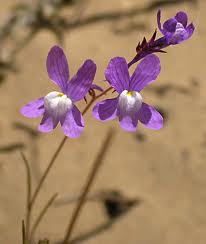|
Linaria (Toadflax) is a large group of annuals, biennials and perennials belonging to the Snapdragon family, Scrophulariaceae. Toadflaxes are useful for growing in the flower border, the rock and wall garden, for growing in the crevices of flagged or paved paths, and for cutting. Some varieties can even be cultivated in a greenhouse. L. triornithophora (Three Birds Toadflax) is an erect-growing perennial from 2 to 3 feet in height. It grows wild in the scrub and hedgerows of Spain and Portugal. Its lance-shaped, grayish-green leaves are smooth and grow in whorls of 3 or 4 along the stems. From mid- to late summer, small flowers (resembling Snapdragons) are produced in thin spikes; they are purple with yellow throats. The flowers are arranged as to look like three birds, thus the common name. L. vulgaris (Butter and Eggs) is a native of Europe and Asia Minor and is naturalized throughout North America. It grows 2 or 3 feet high and bears tons of beautiful, intense yellow flowers with darker golden lips from spring until fall. This plant will freely reseed itself, so a place should be chosen where its increase wouldn't be a nuisance. L. bipartita is an annual from Portugal, which grows from 9 to 12 inches high. Its violet-purple flowers have orange lips and thin leaves. Other varieties will be mentioned below in the varieties section.
Pot Cultivation
Toadflaxes are easily grown in ordinary, well-drained soil in sun or light shade. Garden varieties of the annual L. maroccana are suitable for growing in a cool greenhouse as flowering pot plants or for cut flowers. They need porous, fertile soil and a sunny location.
Propagation
They may be increased by division of the roots in the spring or fall, or by sowing seeds in light soil at those same times.
 |
|
| L. bipartita |
|
Varieties
- L. triornithophora;
- L. purpurea & var. Canon Went;
- L. dalmatica;
- L. macedonica;
- L. genistifolia;
- L. alpina & var. albal, rosea;
- L. bipartita;
- L. canadensis;
- L. crassifolia;
- L. heterophylla;
- L. maroccana;
- L. reticulata & var. aureo-pupurea;
- L. vulgaris.
|